
Vaccine against ACNE is a step closer after scientists block bacteria which cause swelling
Vaccine against ACNE is one step closer after scientists find a way to block the bacteria which causes skin to become red and inflamed
- Experts say the body’s immune system could be used to control acne bacteria
- Blocking certain toxins which are already in the body could reduce swelling
- The California scientists say their vaccine offers hope for millions of people
A vaccine to treat and prevent acne could be a step closer to reality after a study revealed a way to block bacteria which damage the skin.
Scientists have, for the first time, successfully targeted a type of bacteria which lives in the skin and stopped it producing toxins which cause inflammation.
The treatment is a form of immunotherapy which uses the body’s own immune system to tackle the bacteria.
And the discovery could be a ray of hope for the hundreds of millions of people worldwide who suffer from the unpleasant skin condition.
Experts say finding a way to battle acne from within the body could eliminate the need for harsh medicines which can have brutal side effects and may not work.

Scientists say they might be a step closer to developing a vaccine to target acne after they worked out how to block bacteria in the skin from releasing toxins which cause swelling
A study by the University of California in San Diego did laboratory tests on mice and human skin taken during biopsies.
The scientists confirmed that sending proteins from the immune system – called antibodies – to an acne-causing bacteria could reduce swelling on the skin.
The bacteria, known as Propionibacterium acnes, live harmlessly on the skin of most people but in those with acne it can cause red bumps to flare up.
-

Ebola outbreak that has killed 75 in four weeks in the…
‘Sweeteners ARE safe and they DON’T make you hungrier’:…
The speed you type on a keyboard could reveal if you are in…
Tiny brain chip implant could help curb epileptic fits by…
Share this article
To do this it releases a toxin, which researchers believe can be stopped in its tracks using their new vaccine.
Antibodies are sent to the P. acnes bacteria by the vaccine and block it from releasing the toxins which cause inflammation in the skin.
In their experiments, blocking the P. acnes bacteria successfully reduced inflammation in real human skin samples with acne.
‘The potential impact is huge for hundreds of millions of people’
‘The potential impact of our findings is huge for the hundreds of millions of individuals suffering from acne,’ said lead investigator Chun-Ming Huang.
‘Current treatment options are often not effective or tolerable for many of the 85 per cent of adolescents and more than 40 million adults in the United States who suffer from this condition.
‘New, safe and efficient therapies are sorely needed.’
Acne is not defined as an infectious disease because it is caused by bacteria which live harmlessly on the skin of most people.
WHAT IS ACNE?
Acne is a common skin condition which causes various types of spots which can appear on the face, back or elsewhere on the body.
It is most common in teenages but can affect adults, too, and ranges from a few spots to more serious swelling of the skin which can leave scars.
Although the condition is not serious it can be uncomfortable and embarrassing, potentially affecting people’s social lives or causing depression.
It is caused when skin glands produce too much oil which blocks hair follicles along with dead skin cells, which produces spots.
Bacteria living in the skin may then multiply in the oily conditions and cause redness and swelling around the blocked follicles.
Triggers for the condition are believed to include hormonal imbalances, smoking, and certain cosmetics or medicines.
Various treatments exist, including antibiotics, steroids and horme therapy.
Source: British Skin Foundation
But the bacteria can multiply around spots caused when skin oils block hair follicles, and cause larger nodules, pustules and cysts to develop.
‘This opens exciting new avenues of treating acne’
It is not clear why only some people are affected by the P. acnes bacteria but hormonal imbalances, smoking and certain medications or cosmetics can all trigger acne.
Symptoms may cause scarring and the upset they cause can lead to mental health problems like depression, but acne itself is not a serious illness.
Dr Anton Alexandroff, consultant dermatologist and British Skin Foundation spokesperson told MailOnline: ‘We know that acne affects both teenagers and adults, leaving a lasting effect on psychological well-being.
‘This opens exciting new avenues of treating acne – including the potential to create an acne vaccine which would prevent acne altogether – which would be fantastic for acne patients in the future.’
Current medications can include steroids and antibiotics which can cause unwanted side effects.
Plans for large clinical trials
And while one expert warns any immunotherapy must be ‘cautiously designed to avoid unwanted disturbance’ of the skin, the California researchers are confident theirs could work.
They intend to do further studies to develop a chemical or vaccine which is safe and effective in humans and to carry out large clinical trials.
Their findings were published in the Journal of Investigative Dermatology.
Source: Read Full Article